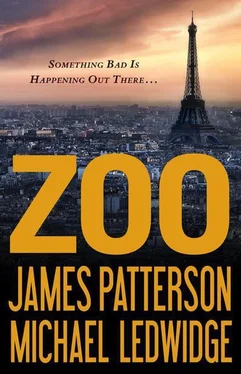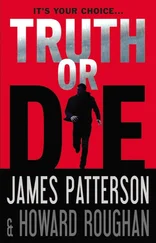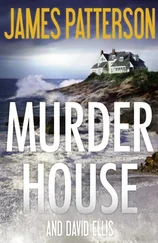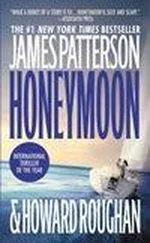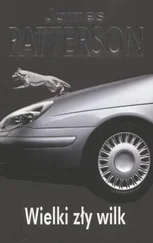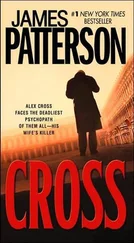After swiping them all off my legs, I thumbed the waist of my boxers for the most vital check of all. Clear.
“Thank God!”
Ant-free now, I squeezed my feet back into my unlaced boots and went about stomping the little bastards as they tried to scatter.
“Not so tough without your friends, are you?” I screamed at them, hopping like a crazed leprechaun, doing a little ant-killing jig in the dust. “Die! Die! Die!”
When the last ants scampered away, I caught my breath and inspected my arms, my legs, my chest, and back. My flesh was pebbled with welts, welts on top of welts, each about as red and juicy-looking as a maraschino cherry.
Suddenly, as though shaken from a dream, I remembered the woman. I turned and looked at her up close for the first time. She was petite—tiny as a child, with slender, birdlike bones. Even covered in river mud, she was undeniably good-looking—olive skin, bitumen-black hair slightly dusted with premature gray, sharp brown eyes, and high, distinct cheekbones.
“You saved my life,” she said softly. She was still gazing somewhere into the middle distance. Her English had an elegant European lilt, what I thought was a French accent—vowels in the front of her mouth, consonants brushed with feathers. She hugged her knees, her body a seesaw anchored on her tailbone, rocking back and forth in the dirt. She definitely wasn’t all there yet, but the lights were coming on.
Then I recalled I wasn’t wearing pants. I slapped them into the dirt to knock any stray ants out of them and worried them on over my boots. I checked my camera in the backpack to make sure all was fine and sat down on a rock to lace up my boots.
“You saved my life,” she said again, more lucid now.
“Actually,” I said, grabbing her hand to pull her up, “I’m not done.”
WE HALF JOGGED the rest of the way back to the camp. It took us a little over an hour. In silence, the woman followed, still somewhat out to lunch in her brain, off somewhere else. It was late afternoon now, verging on gloaming, what photographers call the golden hour. The sinking African sun was huge above the darkening horizon, hanging there like a ball of burning blood. Bats had come out, flittering, swooping, and diving to catch insects. The world was beginning to chatter with twilight noises.
“Find some dry clothes and get changed,” I said, guiding her into the first of the camp’s platform tents. “We’re not out of danger yet. I’m going to need your help barricading this place before nightfall.”
After I left her, the first thing I did was look for another gun. I couldn’t find one, not in any of the other tents or the storage container. Not anywhere.
So I went to the next item on my priority list. I headed straight for the camp’s centrally located bar and dining area and cracked the seal on a bottle of twelve-year-old Glenlivet—for medicinal reasons. I poured some on my smarting arms and legs and took a swig.
I was trickling Scotch down my back when I heard the unmistakable mumbling drone of a plane. Thank God. I ran out onto the little road that led to the airstrip and waved my arms as a single-engine plane buzzed low over the camp.
The plane waggled its wings in response as it flew past. It cut a wide arc around the camp and came circling back. As it roared overhead again, something fell from its window and landed in the reeds beside the airstrip. I searched thrashingly in the reeds and found it: it was a note crumpled around a stone.
“Staff informed us of situation. Need to check on camp farther upriver,” the note said. “Back in twenty minutes.”
I jogged back to the bar. Maybe we weren’t dead after all.
I’d switched the Glenlivet for a bottle of Veuve Clicquot when the woman came in carrying a bag. She was wearing fresh khakis and a faded white polo, but she was still filthy, scratched up, hair bedraggled, muddy, wet.
“Was that a plane?” she asked.
“Yeah,” I said from behind the bar, unwinding the wire cage around the cork. “They saw us and dropped a note saying they’ll be back soon.” I thumbed out the cork. It popped and hit the drum-tight inner wall of the tent. The bottle smoked and white foam cascaded over my fingers like a science-fair volcano. I slurped Champagne off my wrist and took a swig.
“ Vive la being out of here in twenty minutes,” I said, offering her the bottle.
“Twenty minutes?” she said, eyes brightening with panic. “But we need to get out of here now!”
I looked at her hands: they were shaking like a machine about to break. I put the bottle on the bar and walked around to her.
“It’s okay,” I said. “We’re going to be okay, Miss…”
“My name is Chloe. Chloe Tousignant,” she said. She slumped and gripped the counter with one hand. She began to look sick, the color draining from her face.
“Listen, Chloe,” I said, guiding her onto one of the bar stools. Her thin shoulders were shaking. I tried to rub them, but the muscles under her skin were so tensely knotted it was like massaging sponge rubber.
“You’ve been through hell, but you’re okay now. I promise you. Nothing’s going to happen now.”
She didn’t reply. Her color wasn’t getting better.
“Come on, Chloe,” I said. “Stay with me. Can you talk to me? Who are you? Were you with the safari that was attacked? Were you on vacation?”
“No, I’m not a tourist. I’m a scientist. Population ecology.” The words came out of her in a rapid, piqued flutter. Talking seemed to help, at least. “Our group came from the École Polytechnique in Paris.”
That’s an impressive institution. École Polytechnique is basically the French MIT. Female biologists I knew usually didn’t look like ballerinas. They tended to favor Morrissey T-shirts and combat boots.
“Have you seen anyone else?” Chloe said. “I was with two colleagues, Jean Angone and Arthur Maxwell.”
“No, I’m sorry,” I said. “You’re the only other person I’ve seen, besides some Botswanan cooks who threatened us with machetes and the guy I came in with, and he’s dead.”
She shook her head and bit her lip as she stared, glassy-eyed, at the floor.
“Why were you here?” I said. “A field trip?”
“Yes,” she said, nodding. “We were collecting data on migratory birds at the Moremi Game Reserve. We came here to the delta two days ago. The lions attacked at dusk the day before last. They fell from a tree. The guide died first, and then everyone ran. I don’t know how I escaped. I fled across the water and spent the night in a tree. When I heard your truck, I climbed down and headed for the sound. I was wading back across the river when I saw the crocodiles, and climbed onto that rock, and then just stayed there waiting for them to go…”
She closed her eyes and took a shivery breath. When she opened them again, I suddenly realized I’d been wrong about her. She wasn’t just good-looking. There was something else, something austere and regal about her face. She was beautiful.
“And you are?” she said. “An American reporter? A documentarian?”
“My name is Jackson Oz,” I said. “I came here to try to document aberrant behavior in lions. I got a tip that the lions in Botswana were acting weird from a guy I know—well, knew—Abe Bindix, who guides safaris here. Or did. His brother ran this camp, but he’d been out of contact for days, and we came to check on him. We were searching for you when the lions attacked us today. I escaped, but Abe died. There was nothing I could do.”
Before I knew what was happening, Chloe softly took my hand in hers. She leaned forward and gave me a soft kiss on both cheeks.
“Thank you so much for what you did,” she said, starting to tear up as she continued to hold my hand. “I was so tired. I was in despair. If you hadn’t come along right then, I’m not sure if—I don’t know if I would have lived.”
Читать дальше
